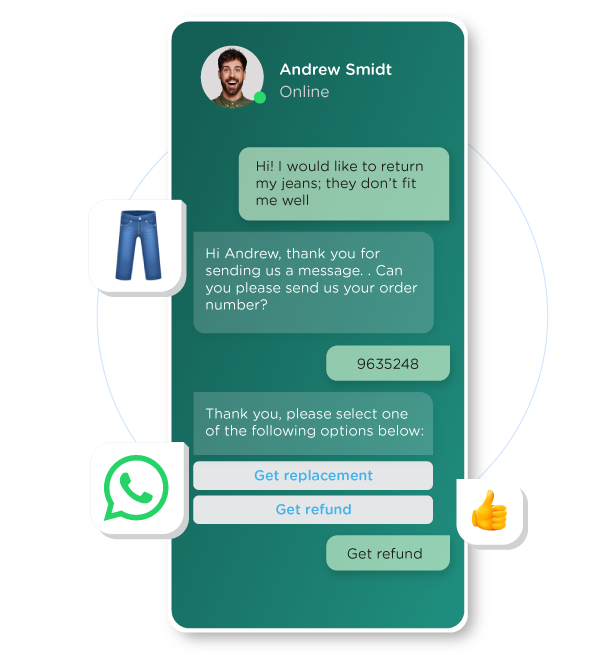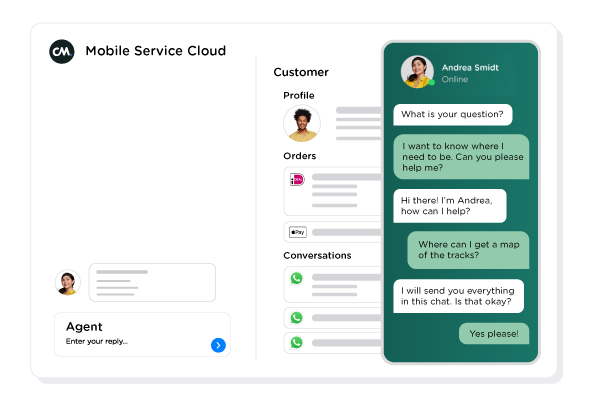- Benefits of WhatsApp Business for Customer Service
- How to Manage Customer Service Enquiries From WhatsApp Business
- Benefits of Managing WhatsApp via Mobile Service Cloud:
- How Radius Payment Solutions Manages WhatsApp Business
- Get Started With WhatsApp via Mobile Service Cloud
Benefits of WhatsApp Business for Customer Service
As a customer service channel, WhatsApp is unmatched; 57% of users regularly communicate with a brand on WhatsApp, and 69% of respondents are more likely to buy from a brand if the option to contact them via WhatsApp is available. Why? WhatsApp Business enables companies to connect with customers via their favorite messaging channel and provide fast, effective customer service anytime. The channel simplifies customer interactions with key business features, such as Quick Replies, allowing customers to select a response rather than typing it manually, and Contact Labels, categorizing and managing customer interactions more efficiently.
Alongside efficient customer service, WhatsApp Business offers some additional features to help you provide superior customer experiences.
Customer Feedback
Letting customers send their feedback via WhatsApp without the extra clicks required to send them to your website or a feedback tool means you benefit from higher engagement rates, and your customers can fill out questionnaires at their leisure.
Tracking and Order Updates
Keeping customers in the loop is vital. WhatsApp lets you share critical information such as status updates and delivery confirmations, helping to keep your customers informed.
FAQ and Service Automation
A WhatsApp FAQ chatbot can take the pressure off your customer service team by automating responses to repetitive questions. It means faster, more effective service for your customers regardless of the time of day (or night).

How to Manage Customer Service Enquiries From WhatsApp Business
You now know the benefits of WhatsApp Business for customer service. But you may still need clarification on how your agents could manage an influx of additional questions via WhatsApp. Or even why you need a solution to manage inbound enquiries in the first place. Especially given that you can respond directly on WhatsApp.
To start, companies looking to respond to a small number of messages can do this from the WhatsApp Business App, but once a business grows and receives a higher volume of messages, the app has limitations. With this, companies facing an influx of service enquiries need the WhatsApp Business Platform, which supports enterprises with unlimited users and devices. In short, if one or two people are unable to manage the volume of customer service enquires via the WhatsApp Business App, your business needs the WhatsApp Business Platform.
So, why not simply use WhatsApp Business Platform?
WhatsApp Business is unlikely to be the only customer service channel used. Email, live chat, and even social media such as Facebook Messenger and Instagram are popular for customers to contact brands. This can add complexity and additional work for your service agents, as they need to switch between multiple tools, apps, and channels to manage customer service.
Our research found that 46% of respondents use multiple channels simultaneously, including WhatsApp and Facebook Messenger. Having separate service channels means agents cannot see if a customer reaches out via multiple channels for the same issue.
Implementing a solution to manage inbound enquiries from WhatsApp and other conversational channels can remove complexity and increase efficiency for your agents. When looking for a solution, you'll need to focus on one that aggregates all conversations into one place.
With CM.com's Mobile Service Cloud, an all-in-one customer service solution, businesses can easily manage the continuously increasing customer queries via WhatsApp and other channels. Mobile Service Cloud enables agents to follow conversations in one omnichannel inbox easily, prioritize conversations based on urgency, and interact with colleagues on individual issues to resolve a problem quickly. As an approved WhatsApp Business Platform provider, Mobile Service Cloud also supports WhatsApp's key features for customer service.
Benefits of Managing WhatsApp via Mobile Service Cloud:
Prioritize conversations that need attention first. When facing an influx of service enquiries, knowing which ones to respond to can be challenging. Therefore, most agents pick the first in the 'queue'. With smart inbox management, this prioritization can be based on channel SLAs, for example.
Direct customers to the right team member. Customers can become annoyed when directed from colleague to colleague until they finally reach the correct department. With skills-based routing, your customers immediately speak to the right team member to deal with an issue based on location, skills, or language.
Understand your customers. If customers are misunderstood or perhaps are dealing with a repetitive issue, they often feel frustrated with unhelpful answers. With conversation history, your agents can see the entire history of each customer contact, regardless of which channel the conversation took place, such as WhatsApp or Instagram. This provides your agents with relevant and vital context to respond in a helpful and informative way. It is also beneficial when customers switch channels.
Enable team collaboration. Customer service is teamwork, so different departments need to be able to work together and collaborate. With team collaboration,agents can assign tasks to different team members, notify others when each task is completed, and even speak with colleagues from the same window. When a customer reaches out via WhatsApp with a question about a particular store, the service agent can contact a colleague in that store to find the correct information, for example. Collaboration is essential when multiple agents or departments are needed to solve a customer's question.
Provide the right information to find a solution quickly. Customers prefer to avoid repeating themselves when speaking to different agents.With customer profiles, agents can access all of the data on a specific customer once they get in touch, meaning they get to the heart of the issue without asking the same questions the customer has likely already answered. Our research found that customers contact customer service at work or in the car. So, when a customer is on the go and reaching out via WhatsApp, they can receive a quick response and go about their day.
These features lead to more efficient agents because they have all the information they need at their fingertips; they can find the correct answers faster and relay them to customers more quickly. With Mobile Service Cloud, you can help them promptly manage inbound enquiries via WhatsApp, boosting team productivity and improving customer service.

How Radius Payment Solutions Manages WhatsApp Business
Radius Payment Solutions uses Mobile Service Cloud to handle incoming WhatsApp enquiries from its vast and growing roster of customers. This means customer service agents can be one click away when needed. As a result, Radius can easily communicate via WhatsApp, proactively responding to customers and keeping on top of the increasing inbound messages.
Get Started With WhatsApp via Mobile Service Cloud
Our Mobile Service Cloud will help your team provide superb customer service via WhatsApp and proactively respond to inbound enquiries. Customer service is complex enough without mentally managing a vast array of different platforms and user interfaces. Keeping it simple is the answer.
Watch the video and discover how easy it is to follow up a customer via WhatsApp in Mobile Service Cloud:
If you’d like to learn more and see a demo of WhatsApp via Mobile Service Cloud, get in touch with one of our experts, and we’ll schedule a call to discuss your needs.
